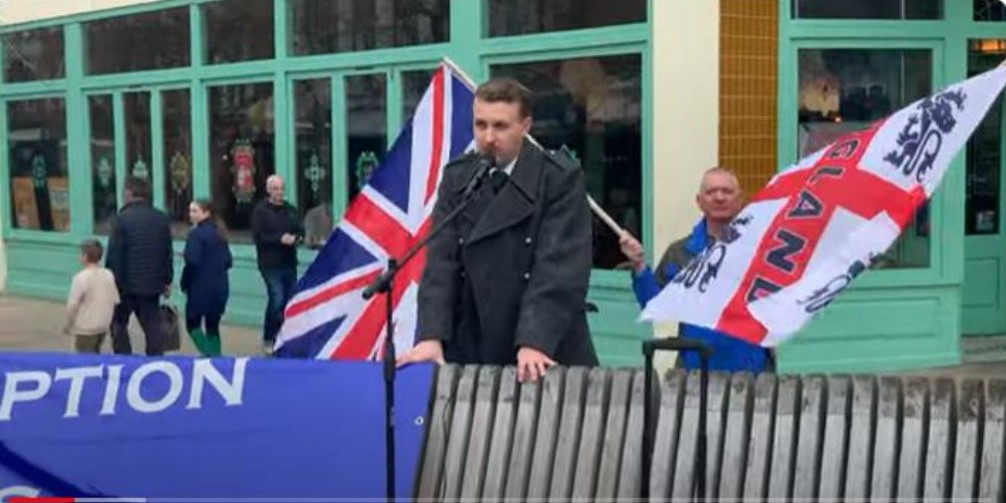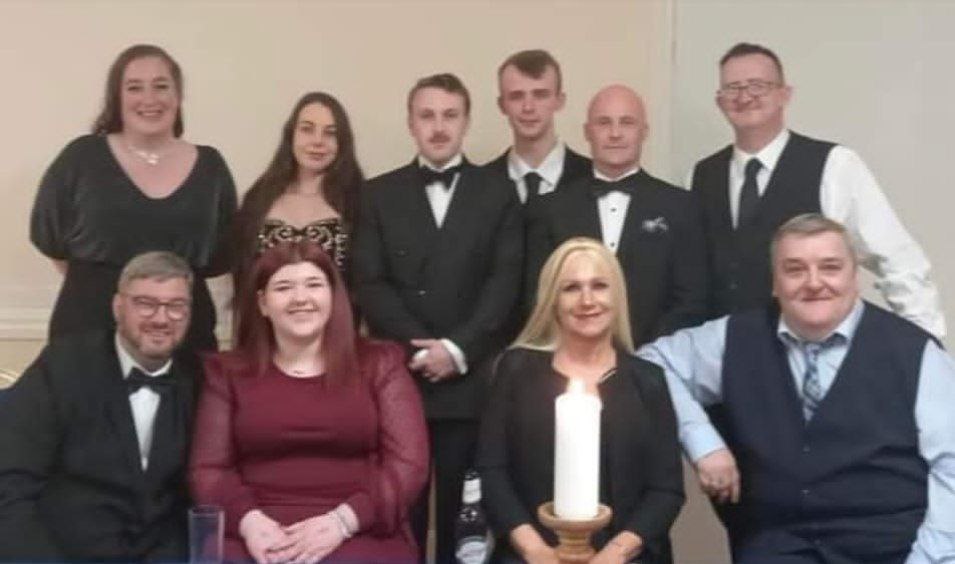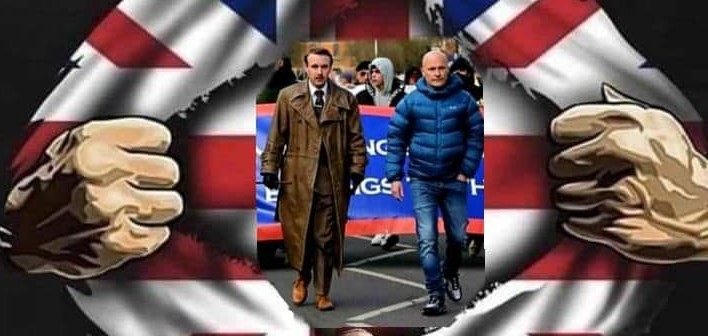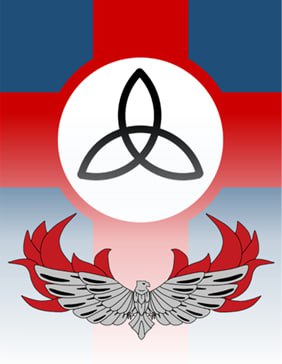
Britain’s newest neo-Nazi political party has been launched and is officially registered to fight elections. It is led by a much-ridiculed Hitler-lookalike. So is it a joke or to be taken seriously? Mark Scholl investigates…
Though he pretty much fits the bill for the title Modern-day Authoritarian Demagogue (and who are we to deny him the acronym ‘Mad’?), Alek Yerbury’s penchant for affecting a long trench coat, sporting a small moustache and adopting a hands-covering-genitals pose when at rest arguably makes him a trifle more retro than modern. Who is it that he reminds us of? We can’t quite place it.
Privately educated in Adelaide, Yerbury later served in the British Army’s 5 Rifles and now operates from a Post Office box in Knottingley, West Yorkshire (rapidly becoming known as ‘Nuttily’). He uses social media to communicate with his thousand plus subscribers.
This bizarre individual, who is now leader of the curiously named National Rebirth Party (NRP), first came to prominence within Patriotic Alternative’s orbit at a number of protests against sites and facilities used by the government to house asylum seekers and refugees.
Standing out because of his looks – an admixture of Adolf Hitler, Oswald Mosley and, perhaps, some friend or foe of Bertie Wooster* – Yerbury appeared very much the petty bourgeois angry young man whose whole outlook is rooted in a fantasy past of struggle against the red forces and a simultaneous attempt to turn back the clock to heady late Victorian days of empire and undisputed white supremacy.

Yerbury (back row 3rd from left) at Scampton activists dinner
It is reasonable to wonder why anyone might have taken a young man who presents himself in this manner as anything more than a live action role-playing game figure. From the Steampunk genre, perhaps. Dieselpunk. Nazi Punk. But this didn’t prevent him from assembling the grandiosely titled National Support Detachment – a stunted Abteilung that included violent ex-English Defence League thugs and various fascist oddballs – which was both short-lived and a total failure.
Dispirited by poorly organised and ineffective protests at facilities like RAF Scampton – and the realisation that such protests were more about raising Patriotic Alternative’s profile and, vitally, its bank account – Yerbury became scathing: “If a hundred thousand Palestinians marching through London doesn’t influence the politics of the nation, then a few nationalists protesting won’t either.”
Clearly, Yerbury hadn’t noticed that there are not “a hundred thousand Palestinians” marching in the UK – the crowds are almost entirely composed of Britons. And regardless of your personal opinions on Gaza, these marches and similar events have actually had huge political significance both nationally and internationally. The Conservative Party leadership is plainly terrified of them.

Yerbury with fellow co-thinker and thug Scott Pittsy: the men who put the scam in Scampton
But the dedicated demagogue doesn’t always require facts, even ‘alternative facts’, to support his arguments. He is always impatient, desiring action. Always happy to write off all but those few who support their own poisonous views, the Yerburys of this world are damaged individuals whose hatred for modern life is palpable. The political system is failing because it seeks, some of the time at least, to protect vulnerable minorities. It is degenerate: “The British people have suffered terribly at the hands of the Westminster Criminals, and all the parties and people that promise to end it, have so far only proven themselves to be equally part of it.”
Yerbury has written a 20-point Agenda and published it online. Not quite as ambitious as Hitler’s 25-point outline for the Nationalsozialistische Deutsche Arbeiterpartei (the Nazis) but, well, reasonably close.
In this unpleasant production, many common themes emerge. Criminals and deviants must be hanged. Obedience to the “national community” is essential. A Yerbury government would have “total authority” over all aspects of national life. Youngsters will be forced to do National Service. Just like in Nazi Germany everything will be run by the state. Or to quote Alek Yerbury’s hero, Sir Oswald Mosley, “All for the state, and the state for all.”
Goodbye any idea of individual liberty or personal autonomy. “Those who refuse to carry out their duties will be stripped of their rights.” (Agenda #5.)
Anyone who’s read Mosley’s The Alternative, Tomorrow We Live, or The Greater Britain will find many similarities with Yerbury’s ideas and proposals. Indeed, the fascist flash of action, its blue and red colours used by the British Union of Fascists and, post war, Union Movement, are relocated in the party logo of the NRP. The Celtic cross, much beloved by neo-Nazis worldwide, makes an appearance, as does a phoenix. The triquetra, another Celtic symbol, is also used. Typical, and expected, Nazi fare.

The NRP logo
On reading Yerbury’s Agenda, published on his party website, we can see a cobbled together manifesto drawing on fascist ideas with scraps of socialism – a planned economy – thrown in for good measure: “We demand that all public utilities and transportation networks be placed into public ownership. The only profits they will take will be those required for future investment.”
But, like all historical fascist movements, the real focus is upon private enterprise. Fascist movement always appeal to the smaller business person, the lower middle class, rather than the mass of (industrialised) labour. Like all fascists, Yerbury dislikes independent and organised Trades Unions, because their interests will not ally with fascist principles, unless “…all trade unions be amalgamated and the national government assume the duty of the protection of the worker.”
Hence the fascist produces words to appeal to all, just like the old gang politicians they claims to despise. Much of his Agenda is meaningless words because all business, industry and economy would necessarily have to be placed on a war footing. Fascism, essentially, means war; the inevitable conflict between peoples, races and those who disagree with Alek Yerbury and his foot soldiers.
Yerbury, like Mosley, like Mussolini, like Franco, believes in duty. “We demand that every British citizen has a duty to be productive, to the best of their ability. All honest work is honourable, and work is a duty.” No mention of wages to rise in line with inflation. No mention of a minimum wage. Detail is deliberately omitted.
It’s just what the Nazis did. And yet Yerbury asserts, in his writing, that we should never look to the past, even though his every word and policy is at least 80 years out of date – not that such ideas were ever acceptable, humane or decent.
“Everything must be centred around the concept of National Solidarity. The only community of worth to us is our National Community. Nothing more, nothing less. Every single city, town and village in our land exists only as part of a greater whole. Our people, born of this land and linked to this land through generations of blood, are ONE National Community.” The old Blood and Soil myth – so much for not looking backwards…
Searchlight readers will not be surprised to discover that the NRP is so focused on blood. As we know, pedigree communities are very much the stuff of fantasy. Pure-bloods, half-bloods and mudbloods are ever so Harry Potter. Perhaps Yerbury sees himself as a misunderstood Grindlewald type character.
Blood, of course, means supposed biological differences between races, a pseudoscientific nonsense debunked over and over again. But if you want to upset Yerbury, don’t mention the small fact that, at one point in our collective history, we were all African. And don’t tell Alek that the ancient Britons, much beloved by him and his ilk, were a lot darker than 19th Century race theorists would have you believe.
With blood in mind, who or what is the “National Community” that Yerbury speaks of? Perhaps it’s easier, given the pseudoscience, to tell you who isn’t included in it; non whites and ‘foreign’ elements. (We’re not altogether dismissing the thought that Yerbury is taking a sly potshot at people with ‘foreign’ surnames such as, well, ‘Farage’. But who knows?) We’ve heard it all before. But it is still as dangerous and corrosive as ever: “We demand that only people of British heritage or lineage shall be inherently entitled by birth to be British citizens.” (NRP Agenda, #1). And there you have it.
Those left behind after Yerbury’s coming to power and great purges would occasionally be allowed to have their say in the form of National Plebiscites. Very Vladimir Putin, we must say! Vote for one of the above. Society would, under Yerbury’s proposals, be purged of all “weaker” elements, homosexuals, people who believe in “non-British” religions, leftists, traitors and, you know, pretty much everyone who disagrees with fascism. Which is, he seems not to have noticed, around 99 per cent of the British population.
But, to give him his due, he is a skilled speaker and will inspire the similarly angry. Yerbury knows his political history, but he also confuses the past with the present day. He speaks of “Westminster Criminals.” (Hitler often spoke of the November Criminals.) He rails against the “evil cabal in government that lines its pockets at the people’s expense.” He characterises the whole of modern day politics as a battle between “insane Capitalists” and “international Socialists.” Everything is broad brush. Detail is always lacking.
Yerbury’s rhetorical style is Mosleyite – short bursts of words, often starting with a question. “And what do they want, these traitors, these insects?” (Searchlight has studied his speeches including those recorded in Hull, Leeds and Skegness.) Starting slowly, and in a reasonably calm manner, Yerbury only goes Full Mosley towards the end of his speeches, which normally last between 10 and 12 minutes.
“More fatal to the nation is the enemy within! The enemy within this nation are the parasites and thieves of Westminster… Ours is an ideal rooted in the people; our ideal is the people ourselves who, by history and blood, are tied to this land. We will never be refugees… our people will always make their own destiny. The children of Britannia are at a great turning point…
“When I was in the Army, I realised that I could make myself what I wanted to be. I could find it within myself! The people of this nation are not finished. Our people are designing a future for themselves. You’ve come here today because you’ve decided you have a voice.
“Our people will be on the march to the future they deserve. No more Tory, no more Labour, but a united British people… Remember, how great you are. Use your voice! Know who it is who is your terrible enemy. Remember who spoke against you!”
Compare and contrast with Oswald Mosley (Belle Vue, 1934). “There comes in every great nation a time of destiny, a time of decision. And this nation, again and again, has swept aside convention, has swept aside the little men of caution and delay and have decided to follow men, and movements, who have decided on action… And in the ranks of our Blackshirt legions I say march the mighty ghosts of England’s glorious past with their strong arms around us, their mighty echo down the ages, ever onward…”
Mosley, within two years of that harangue, was pretty much finished as a force within British politics, relegated to a vicious campaign of anti-semitism focused on London’s East End. His defeat in 1936 at the Battle of Cable Street is well known and, although he kept the movement alive until 1939, it was only his remarkable volte face into a peace campaigner, seeking, for obvious reasons, to stop a war between fascism and the free world, that made him at all relevant.
After the war, despite initial fertile ground for a renewed fascism given rationing and the slow pace of reconstruction – especially, again, in the East End – the tide soon turned when Mosley, and his huge ego, returned to action in late 1947. By 1950 he’d been totally defeated by the 43 Group and a much larger anti-fascist campaign.
What we learn from history, and what people like Alek Yerbury fail to learn, is that his type of politics is largely based on ego, fantasy and wicked imaginings about the use, and misuse, of political violence. Operations like the NRP cannot, and will not, ever win power via the ballot box. Such politics largely appeals to the fantasist, the warped idealist who seeks to control and crush, who believes in force, violence and elitism. Yerbury would indeed make a fascinating study for Theodore Adorno whose seminal The Authoritarian Personality is Alek through and through.
Nevertheless, and despite this, in the current febrile political situation in which the UK finds itself, there is reason to believe that Yerbury’s uncompromising approach may win a core of members and supporters fed up with the failed approach taken by Patriotic Alternative and the less than inspiring community politics approach of either the British Democrats or the Homeland Party. Yerbury’s social media and new party website are rife with criticisms of community politics:
“The prevalent logic in nationalist politics is that in order to achieve power, you start at the bottom ‘rung’ of the supposed ladder. You engage at a ‘grassroots’ level, targeting parish and local councils, and then, only with time, work up to greater things. This is a misunderstanding of the nature of the system. Local councils are not a stepping stone to parliamentary government, which MUST by necessity be the ultimate goal, since it is the only level at which issues like immigration, the economy and political reform can even be addressed.”
Despite the recent minor media storm surrounding the righteous imprisonment of PA’s Sam Melia, and the opportunity it has presented leader Mark Collett and his NCO Laura Towler/Tyrie/Melia to rake in almost £70,000 in donations, Collett’s approach has totally failed. It is based on publicity seeking stunts and what has been described by former members and supporters as ‘grooming’ of younger members via online gaming activities, rather than either effective street action or electoral engagement.
Collett himself does not cut an impressive appearance. He lacks charisma and leadership ability, which is why Kenny Smith and PA’s most able activists left Collett last year. Collett is, like his rival Paul Golding, all about the money because he’s unemployable outside extremist politics.
Yerbury, like it or not, is rather more intelligent and ‘political’ than Collett and other characters on the far-right fringes. Despite his concocted appearance, which is almost certainly theatrics plus nostalgia – a real-time political fantasy – he will assuredly appeal to a certain number of people. His whole fascist shtick will appeal to those yearning for a New Mosley, a leader who can at least elucidate a neo-fascist platform and who has military experience. This will give him some credibility, though nothing like mass appeal.
Yerbury, has an iron belief that, “it’ll take us maybe 15 years to achieve power.” This also ties into the whole neo-nazi notion of will; that it is a people’s innate will to survive, triumph or dominate. It is an idea used to justify the racist excesses and abuses of empire and to justify mass murder throughout history. It is the will of one race to dominate another. Combine this with the ‘iron will’ of the ‘leader whose time has come’ and victory is possible. Or so the story goes.
What this belief does do is to create a lot of strutting egos, of puffed up, nihilist and dangerous men sure of their limited facts – and their sketchy partial histories – forcing their way on to the political stage. Violence is inevitable. Post war neo-fascist history is littered with such men: Colin Jordan, John Tyndall, Lincoln Rockwell, Nick Griffin, Julius Evola, Francis Parker Yockey, Matt Koehl, any Klan leader.
That’s why we at Searchlight will be keeping a very keen eye on Alek Yerbury and the National Rebirth Party through 2024 and beyond…
*PG Wodehouse lovers would doubtless like us to remind readers that one of Bertie Wooster’s nemeses in the Jeeves books was the ”amateur dictator” Roderick Spode. Spode was the leader of a ragtag fascist party called the Saviours of Britain, often referred to as the Black Shorts. Descriptions of Spode include one that his unsatisfactory moustache was “like the faint discoloured smear left by a squashed blackbeetle on the side of a kitchen sink”. Yerbury take note – Ed.

Thank you, I’ve just been looking for info approximately this topic for a long
time and yours is the greatest I’ve came upon so far. However, what concerning the bottom line?
Are you sure in regards to the source?